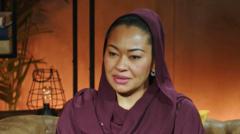*Concerns grow as Akpoti-Uduaghan alleges she faced harassment while being penalized for her accusations, prompting calls for a thorough investigation and highlighting challenges faced by women in Nigerian politics.*
**Nigerian Senator Accuses Senate of Cult-like Practices Following Harassment Claims**

**Nigerian Senator Accuses Senate of Cult-like Practices Following Harassment Claims**
*Natasha Akpoti-Uduaghan speaks out against Senate President Godswill Akpabio, raising alarms about gender equality in Nigeria.*
In a striking interview with the BBC, Nigerian senator Natasha Akpoti-Uduaghan has described the country's Senate as operating akin to a "cult", following her six-month suspension after alleging sexual harassment by Senate President Godswill Akpabio. Akpoti-Uduaghan, whose accusations have sparked significant dialogue on gender issues within Nigeria's conservative society, claims she was penalized for speaking out and is experiencing intimidation since losing her security detail.
The senator asserts that the workings of the Senate are undemocratic, stating, "There is no freedom of speech, there is no freedom of expression," and adds that dissenters face severe consequences. Her accusations against Akpabio include suggestive comments made during a visit to his residence and remarks belittling her in front of other senators. However, Akpabio's office has firmly denied all allegations, stating that no inappropriate conduct occurred.
Female representation in Nigeria's Senate is notably low, with only four women among 109 members. Akpoti-Uduaghan became the first female senator from her state yet faced procedural challenges when filing her petition, which was dismissed, and later received a lengthy suspension for what officials described as "unruly behaviour". This move has drawn criticism, as civil society groups demand an unbiased investigation into her claims.
Amidst a palpable sense of fear for her safety—heightened by the stripping of her security—Akpoti-Uduaghan expressed her anxieties for herself and her young child, citing historical threats to politicians who challenge governmental authority in Nigeria. Women's rights organizations have rallied around her, seeing her suspension as a setback for women’s empowerment in the political sphere, and calling attention to the ongoing struggle many women face in similar positions of power.
Despite the backlash and criticism, Akpoti-Uduaghan remains resolute in her fight, taking legal steps to contest her suspension and hoping to shed light on the pervasive issue of harassment women face in politics. She conveyed the support she receives from fellow female politicians and citizens who share their own stories of harassment in silence. "They say, Natasha, do this for us," she recounted, emphasizing the broader narrative of women's struggles in Nigeria's political landscape.
The situation continues to develop, with public demonstrations emerging in Abuja where supporters of both Akpoti-Uduaghan and Akpabio have voiced their opinions, mirroring the larger societal debate over gender equality and representation in Nigeria. As the story unfolds, it shines a spotlight on the urgent need for reform in the political arena, particularly regarding the treatment of women.
The senator asserts that the workings of the Senate are undemocratic, stating, "There is no freedom of speech, there is no freedom of expression," and adds that dissenters face severe consequences. Her accusations against Akpabio include suggestive comments made during a visit to his residence and remarks belittling her in front of other senators. However, Akpabio's office has firmly denied all allegations, stating that no inappropriate conduct occurred.
Female representation in Nigeria's Senate is notably low, with only four women among 109 members. Akpoti-Uduaghan became the first female senator from her state yet faced procedural challenges when filing her petition, which was dismissed, and later received a lengthy suspension for what officials described as "unruly behaviour". This move has drawn criticism, as civil society groups demand an unbiased investigation into her claims.
Amidst a palpable sense of fear for her safety—heightened by the stripping of her security—Akpoti-Uduaghan expressed her anxieties for herself and her young child, citing historical threats to politicians who challenge governmental authority in Nigeria. Women's rights organizations have rallied around her, seeing her suspension as a setback for women’s empowerment in the political sphere, and calling attention to the ongoing struggle many women face in similar positions of power.
Despite the backlash and criticism, Akpoti-Uduaghan remains resolute in her fight, taking legal steps to contest her suspension and hoping to shed light on the pervasive issue of harassment women face in politics. She conveyed the support she receives from fellow female politicians and citizens who share their own stories of harassment in silence. "They say, Natasha, do this for us," she recounted, emphasizing the broader narrative of women's struggles in Nigeria's political landscape.
The situation continues to develop, with public demonstrations emerging in Abuja where supporters of both Akpoti-Uduaghan and Akpabio have voiced their opinions, mirroring the larger societal debate over gender equality and representation in Nigeria. As the story unfolds, it shines a spotlight on the urgent need for reform in the political arena, particularly regarding the treatment of women.





















